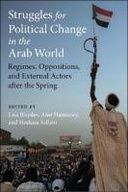Explore

Struggles for Political Change in the Arab World
0 Ungluers have
Faved this Work
Login to Fave
The advent of the Arab Spring in late 2010 was a hopeful moment for partisans of progressive change throughout the Arab world. Authoritarian leaders who had long stood in the way of meaningful political reform in the countries of the region were either ousted or faced the possibility of political if not physical demise. The downfall of long-standing dictators as they faced off with strong-willed protesters was a clear sign that democratic change was within reach. Throughout the last ten years, however, the Arab world has witnessed authoritarian regimes regaining resilience, pro-democracy movements losing momentum, and struggles between the first and the latter involving regional and international powers.
This volume explains how relevant political players in Arab countries among regimes, opposition movements, and external actors have adapted ten years after the onset of the Arab Spring. It includes contributions on Egypt, Morocco, Kuwait, Saudi Arabia, Syria, Algeria, Sudan, Lebanon, Iraq, Jordan, Yemen, and Tunisia. It also features studies on the respective roles of the United States, China, Iran, and Turkey vis-à-vis questions of political change and stability in the Arab region, and includes a study analyzing the role of Saudi Arabia and its allies in subverting revolutionary movements in other countries.
This book is included in DOAB.
Why read this book? Have your say.
You must be logged in to comment.
Rights Information
Are you the author or publisher of this work? If so, you can claim it as yours by registering as an Unglue.it rights holder.Downloads
This work has been downloaded 46 times via unglue.it ebook links.
- 46 - pdf (CC BY-NC-ND) at OAPEN Library.
Keywords
- Political control & freedoms
- Political structure & processes
- Political structures: democracy
- Politics & government
- Society & Social Sciences
- thema EDItEUR::J Society and Social Sciences::JP Politics and government
- thema EDItEUR::J Society and Social Sciences::JP Politics and government::JPH Political structure and processes::JPHV Political structures: democracy
- thema EDItEUR::J Society and Social Sciences::JP Politics and government::JPV Political control and freedoms
Links
DOI: 10.3998/mpub.12237894Editions

